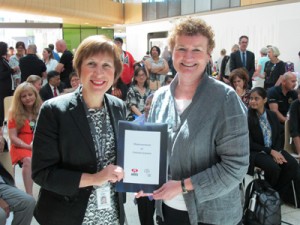AMES forges partnership with Royal Children’s Hospital

AMES has signed a Memorandum of Understanding (MOU) with the Royal Children’s Hospital in a move to improve cross cultural support for patients and families.
The MOU recognises the growing number of families attending the hospital who do not speak fluent English, have recently arrived in Australia, or have cultural or religious preferences that are not readily supported in the hospital.
Two cultural programs are already underway at the RCH under the auspices of the MOU.
Under the first, accredited AMES volunteers have been recruited to join the hospital’s existing 300-person strong Volunteer Service to build cultural diversity within the team.
The second program allows the hospital to support the education and training initiatives of AMES. Commencing Monday this week, 11 AMES clients began a work placement program at the RCH, working with the hospital’s Food Services, Support Services, Infrastructure and Procurement, and Family Services teams.
AMES CEO Cath Scarth said the partnership between AMES and the RCH was one that would continue to benefit both organisations immensely.
“Many of AMES’ clients are from newly emerging communities who may have little understanding of a public health system. We know that the AMES – Royal Children’s Hospital relationship will help to reduce these difficulties and barriers,” Cath said.
“The RCH is the largest children’s hospital in Australia and we are pleased to helping the hospital meet a commitment to becoming culturally competent and increasing its understanding of diversity. This is the first MOU which AMES has signed with a hospital and we hope it leads to further collaborations in the health sector in the future,” she said.
RCH CEO Professor Christine Kilpatrick said a lack of cultural awareness in the health setting was a barrier to delivering great care to all children and adolescents.
“This is hugely beneficial for our hospital, not just in the immediate future but the extended one. In time, we hope to use this increased capability to survey culturally and linguistically diverse patients and families about their hospital experience, to identify and fill any gaps in our service provision,” Christine said.












